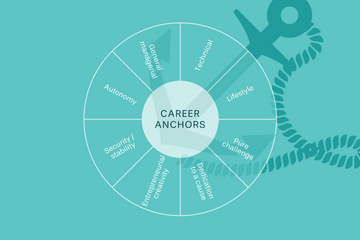Eight career anchors: which ones drive your career?
Dedication to a cause? Autonomy? Security? Faced with a career choice, what is your priority, and what would you never give up? Reflect upon what guides your choices with the eight career anchors and their connection with the international cooperation sector, as presented by Natacha and Daniel.

At a glance
At the Forum cinfo 2021, Daniel Glinz and Natacha Wicht held a session about the eight career anchors defined by E. Schein (1990).
Daniel is a highly experienced professional coach, specialising in intercultural communication and leadership. In her Master’s thesis, Natacha identified the main career anchors of Generation Y (Millennials) and correlated them with their perception of employer attractiveness.
Daniel and Natacha explain more about the career anchors, linking them to the international cooperation sector to make you reflect on what drives your career path.
The eight career anchors
Rather this or that? Certain criteria carry more weight in the balance when facing a career choice – according to one's perspective. Career anchors are underlying career choices. They offer an easy model summarising an individual's talents, abilities, values, and career needs. Developed by Schein (1990), they describe what guides their choices.
Schein developed the following eight career anchors:
- Technical
- Lifestyle
- Pure challenge
- Dedication to a cause
- Entrepreneurial creativity
- Security/stability
- Autonomy
- General managerial
The main career anchors vary according to professional and personal experience. Career goals and aspirations evolve, especially at the beginning of a person’s career. Once individuals have "defined" themselves, their anchors tend to stabilise. At first, guided by several career anchors underpinning different needs, one anchor will stand out. This will be the dominant anchor, the central one. It corresponds to what you would not give up when faced with a career choice.
What wouldn't you give up when faced with a career choice?

Everyone has a particular attraction to one or several career anchors. At the Forum cinfo, Daniel shared that what he enjoys and values the most is to be autonomous in his work. Being driven by the Autonomy Anchor means you want to define your own work in your own way. It is important for you to have the freedom to decide where and how you work. Some people choose, for example, a type of contract that allows this autonomy, such as consultancies, or their preference to have their own business.
Everyone has a particular attraction to one or several career anchors.
This anchor is similar to the Entrepreneurial Creativity Anchor. However, the latter focuses on creating something on your own by taking risks and overcoming obstacles. What you value is seeing the results from your work.
The main motivations to join international cooperation
The main anchors that drive a person can evolve over time. When starting his career in international cooperation at the ICRC, Daniel described what brought him there. At that time, the anchor that drove him was the Pure Challenge Anchor. He said he was mostly interested in putting himself in strange situations: being out of his comfort zone, in a foreign country, with his knowledge of foreign languages. He wanted to see how he could face these challenges. You will definitely find challenges in the international cooperation sector, particularly in humanitarian aid.
Some of Daniel’s colleagues joined the ICRC because they wanted to help people – especially prisoners of war and people detained in internal conflicts.
At the beginning of the forum session, the audience was asked: "Spontaneously, which anchor do you most identify with?". Close to half the audience (48%) answered similarly to Daniel’s colleagues: "Dedication to a cause". If this anchor drives you, it means you are attracted to a job that fulfils the values that matter to you.
Dedication to a cause: if this anchor drives you, you are attracted to a job that fulfils the values that matter to you.
"Spontaneously, which anchor do you identify with more?"
- Technical (4%)
- Lifestyle (7%)
- Pure challenge (11%)
- Dedication to a cause (48%)
- Entrepreneurial creativity (11%)
- Security/stability (4%)
- Autonomy (6%)
- General managerial (9%)
Source: Audience survey, Forum cinfo 2021
In cinfo's study on the interest of young professionals for a career in international cooperation, the two anchors, Dedication to a Cause and Pure Challenge, were also predominant motivators to join the sector. Most respondents answered that they wanted to have a meaningful job and participate in building a fairer world.
It is also something that we often read in cover letters: candidates want to work towards the Sustainable Development Goals (SDGs), work for something bigger, or something that “makes sense”.
The limits to dedication
Even if it is a powerful driver, Daniel underlines the risks with the Dedication to a Cause Anchor: “If you dedicate all your energy to a cause, you might lose yourself. You might forget about yourself and your own needs. Yet, if you only look after your own needs, you might lose the dedication to a cause”. The importance is to find a balance between the two: what you do for yourself and what you do for others: “Do not over-stretch yourself by this dedication to a cause”, he warns.
Between dedication to a cause and your own needs, make sure to find the right balance.
In the study mentioned above, the main criterion for work attractiveness for young professionals is work-life balance, which corresponds to the Lifestyle Anchor. It is not always easy to bring together dedication to a cause and find balance. By choosing to work in this sector, Daniel shared that it could be challenging to have a family life when working in humanitarian aid, especially at the beginning of a career. Daniel had to make a choice between both, but it was also a time when connectivity was far less developed than today. Countries with internal conflicts or disturbances are considered high-risk areas. They are labelled “non-family duty stations”, meaning you cannot bring your partner or family with you. In addition, part-time jobs, particularly in postings abroad, are not easy to find in the sector.
Furthermore, Daniel highlights two scenarios. When going home after work in your home country, you are back to ordinary citizen life. However, when living and working abroad, you will find yourself in an unfamiliar social environment without family or friends, except for your colleagues at work. And you will often be perceived as “the person from XY organisation”, so a boundary between professional and private life is almost impossible. "That can be tiring – or you get used to it".
What about the remaining anchors?
According to the study, the third criterion for job attractiveness for young professionals is security. The Security/Stability Anchor refers to employment or financial security. If you are driven by this anchor, you are very concerned with this issue, and build your career around it. In international cooperation, there are a lot of short-term contracts where you will be asked regularly to move from one country – or even continent – to another. However, Daniel adds: “The more competent you are – that’s your real job security.”
Your real job security? The high level of competence you have.
If your main anchor is the Technical Anchor, your focus may be on applying your skills in a specific area. You enjoy the challenge in your specific area of competence. For example, a specialised skill widely demanded in the sector is to work in WASH (Water, Sanitation and Hygiene). Most start their careers with a technical skill. If this is your primary driver, you tend to avoid management roles, such as team leader or head of department, since these roles take you away from the technical aspects.
Alternatively, you may be driven by the Managerial Anchor. These roles are for you if you are looking for an opportunity to manage others. They also provide opportunities to evolve professionally and take on more responsibility. Daniel highlights that listening to people is central to these roles. Deep listening is an essential skill you may already be interested in acquiring.
Career advice: anchors in action
Daniel invites you to apply this tip:
Next time you look for a job, write the eight anchors on different sheets of paper. Put them in a circle on the floor and consider the job opening you are applying for from the angle of each anchor. Do it physically in a room: stand on the technical one, on the autonomy, on the creativity, on the pure challenge, etc. Ask yourself: "from this perspective, is this the right job for me?"
Consider the job you're interested in from the angle of each anchor.




